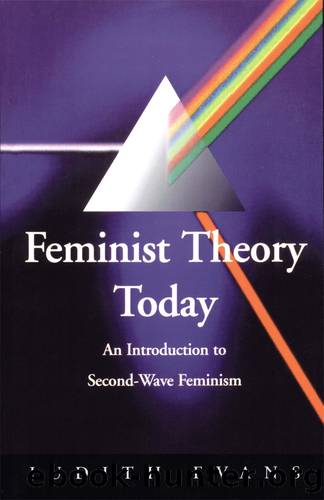Feminist Theory Today by Judith Evans

Author:Judith Evans [Evans, Judith]
Language: eng
Format: epub
Tags: Social Science, Women's Studies, LGBTQ+ Studies, Lesbian Studies
ISBN: 9781473946088
Google: dJY7CgAAQBAJ
Publisher: SAGE
Published: 1995-06-28T03:35:23+00:00
Gilligan: âthe truth of an ethic of careâ?
Gilliganâs famous study, In A Different Voice,10 is the product of her graduate research into the psychology of moral thought. Her work, and responses to it, led to a massive debate on the possibility and desirability of a female ethic of care. There is an irony in that, for it springs from her second-choice topic, the first concerning males. She had hoped to investigate the responses of young men facing the Vietnam War draft, which was by then no longer a âbankableâ theme.11 She chose, rather, to study the expressed views of women having abortions: abortion was by then a âliveâ issue and one that could reasonably easily be researched, given its legalization in 1973. She found, she said, that women had a less universal and abstract, more relational and contextual mode of thought, and more specifically of moral reasoning, than menâs.12 However it is not only the stated finding, but its interpretation, that is crucial here.
Gilligan is one of a number of academic women who, in the 1970s, began questioning sexism within their field. Most male and some female psychologists, have, she says, modelled the âhumanâ, the desirable, the normal, on the male. Not that they have erased difference. They have noted and interpreted the gender differences that they have found. But in their work, women have been devalued and misread.
Gilligan does not, I believe, think this intentional. Sex differences13 have in her view consistently been found. This is not true for all fields of psychology; and as she shows, where differences appear they do so at varying ages. Further, psychologists not infrequently see them as socialized.14 However, she notes a strong tendency to construct one measure of performance, and take the male score on that measure as the norm.
David McLelland, whom she is discussing here, says âmale behaviorâ. I have preferred âscoreâ. Neither term is ideal: we speak of tendencies, and averages, not âall womenâ and âall menâ. But it is easier to speak as if we mean the latter, just as it is easier for me to say âwomenâ, and âweâ, at numerous points in my text. I would expect polarized male and female responses to be found in (observed) group behaviour, and personal interviews, more than in written âtestsâ. There will be more social pressure to fulfil stereotypes at work. So Gilliganâs field may be among the most likely to locate sex differences, or to suggest that they exist.
To accept findings but deny their interpretation has been a fairly standard approach for feminist psychologists, though some have sought instead to show that sex differences do not exist. The latter would say either that the studies in question could not count as proof (they were too small to be acceptable or could not be replicated), or that the data had been misread: difference had been âfoundâ, where there was none.
Thus Gilligan is not typical of feminist psychology. She does, though, represent one important type of response to extant work in a male-dominated field.
Download
This site does not store any files on its server. We only index and link to content provided by other sites. Please contact the content providers to delete copyright contents if any and email us, we'll remove relevant links or contents immediately.
Phoenicians among Others: Why Migrants Mattered in the Ancient Mediterranean by Denise Demetriou(596)
american english file 1 student book 3rd edition by Unknown(595)
Verus Israel: Study of the Relations Between Christians and Jews in the Roman Empire, AD 135-425 by Marcel Simon(589)
Caesar Rules: The Emperor in the Changing Roman World (c. 50 BC â AD 565) by Olivier Hekster(569)
Basic japanese A grammar and workbook by Unknown(557)
Europe, Strategy and Armed Forces by Sven Biscop Jo Coelmont(513)
Give Me Liberty, Seventh Edition by Foner Eric & DuVal Kathleen & McGirr Lisa(491)
Banned in the U.S.A. : A Reference Guide to Book Censorship in Schools and Public Libraries by Herbert N. Foerstel(483)
The Roman World 44 BC-AD 180 by Martin Goodman(471)
Reading Colonial Japan by Mason Michele;Lee Helen;(462)
DS001-THE MAN OF BRONZE by J.R.A(458)
The Dangerous Life and Ideas of Diogenes the Cynic by Jean-Manuel Roubineau(451)
Imperial Rome AD 193 - 284 by Ando Clifford(449)
Introducing Christian Ethics by Samuel Wells and Ben Quash with Rebekah Eklund(447)
The Oxford History of World War II by Richard Overy(444)
Catiline by Henrik Ibsen--Delphi Classics (Illustrated) by Henrik Ibsen(416)
Literary Mathematics by Michael Gavin;(407)
Language Hacking Mandarin by Benny Lewis & Dr. Licheng Gu(403)
Brand by Henrik Ibsen--Delphi Classics (Illustrated) by Henrik Ibsen(379)
